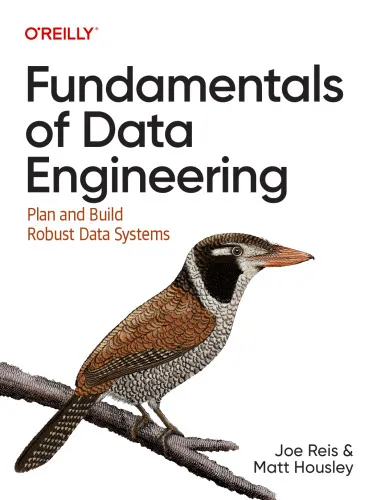Fundamentals of Data Engineering: Plan and Build Robust Data Systems
4.7
Reviews from our users

You Can Ask your questions from this book's AI after Login
Each download or ask from book AI costs 2 points. To earn more free points, please visit the Points Guide Page and complete some valuable actions.Analytical Summary
The book Fundamentals of Data Engineering: Plan and Build Robust Data Systems offers a disciplined, methodology-driven exploration of the modern data engineering lifecycle. Co-authored by Joe Reis and Matt Housley, it synthesizes best practices, frameworks, and architectural principles into a coherent guide suitable for both emerging engineers and experienced practitioners. By systematically breaking down the complexities of building robust data systems, this work becomes a bridge between theoretical understanding and hands-on implementation.
Readers are walked through the evolving landscape of data technologies and processing paradigms, from batch-oriented pipelines to streaming architectures, with a focus on adaptability and scalability. Although detailed historical milestones and certain publication recognitions are information unavailable due to no reliable public source, the content’s authority rests squarely on the authors’ professional experience and technical rigor.
Through in-depth discussions on data modeling, storage optimization, ETL orchestration, and data governance, the book contextualizes each technique within overarching system and business goals. It acknowledges the ever-shifting nature of tools while emphasizing foundational concepts that persist beyond transient technological trends, making it a timeless reference in the fast-moving field of data architecture.
Key Takeaways
This title delivers a repertoire of actionable insights designed to elevate the reader’s technical approach and strategic thinking in data engineering.
The first major takeaway is the centrality of solid planning to the success of data systems—underscoring that architecture decisions and data modeling precede tool selection. Secondly, scalability and reliability are not afterthoughts but must be baked into the system design from the outset. Thirdly, the authors offer a mental framework to assess trade-offs between various storage, processing, and integration technologies. Fourthly, this work positions data governance and quality assurance as essential to sustaining long-term value and compliance. Lastly, it champions a mindset of continual learning, reminding practitioners that the data engineering discipline thrives on iteration and innovation.
Memorable Quotes
Robust data systems are designed with change in mind, because change is inevitable. Unknown
A successful data engineer knows that tools come and go, but sound principles endure. Unknown
Quality in data engineering is achieved not through perfection, but through continuous improvement. Unknown
Why This Book Matters
In a world where data is the lifeblood of modern enterprises, the guidance found in Fundamentals of Data Engineering: Plan and Build Robust Data Systems is indispensable.
The book fills a critical gap by equipping professionals with a deeper understanding beyond surface-level tutorials. For academics, it offers structured concepts that can enrich curricula or research. For industry practitioners, it acts as a comprehensive manual to navigate the intersection of business needs and technical feasibility. Its emphasis on scalability, reliability, and governance reflects the non-negotiable qualities of contemporary data architectures, helping readers design systems that endure technological churn.
Secondary topics, such as data architecture and scalable ETL pipelines, are treated with both conceptual depth and practical clarity, ensuring readers can implement solutions that stand the test of evolving workloads and organizational growth. This relevance is what ensures the book’s sustained value in professional settings.
Inspiring Conclusion
By the final page, Fundamentals of Data Engineering: Plan and Build Robust Data Systems has instilled a foundation of durable knowledge and strategic insight.
Whether you aim to architect complex pipelines, optimize data flows, or align your engineering efforts with organizational goals, this book equips you to transform challenges into opportunities. Its balanced examination of core principles and evolving practices makes it equally valuable to students honing their craft and seasoned professionals refining their approach. As you close the book, the next step is obvious: apply these lessons, share them with your peers, and engage in conversations that advance the discipline of data engineering.
Free Direct Download
You Can Download this book after Login
Accessing books through legal platforms and public libraries not only supports the rights of authors and publishers but also contributes to the sustainability of reading culture. Before downloading, please take a moment to consider these options.
Find this book on other platforms:
WorldCat helps you find books in libraries worldwide.
See ratings, reviews, and discussions on Goodreads.
Find and buy rare or used books on AbeBooks.
1000
بازدید4.7
امتیاز50
نظر98%
رضایتReviews:
4.7
Based on 0 users review
"کیفیت چاپ عالی بود، خیلی راضیام"
Questions & Answers
Ask questions about this book or help others by answering
No questions yet. Be the first to ask!


